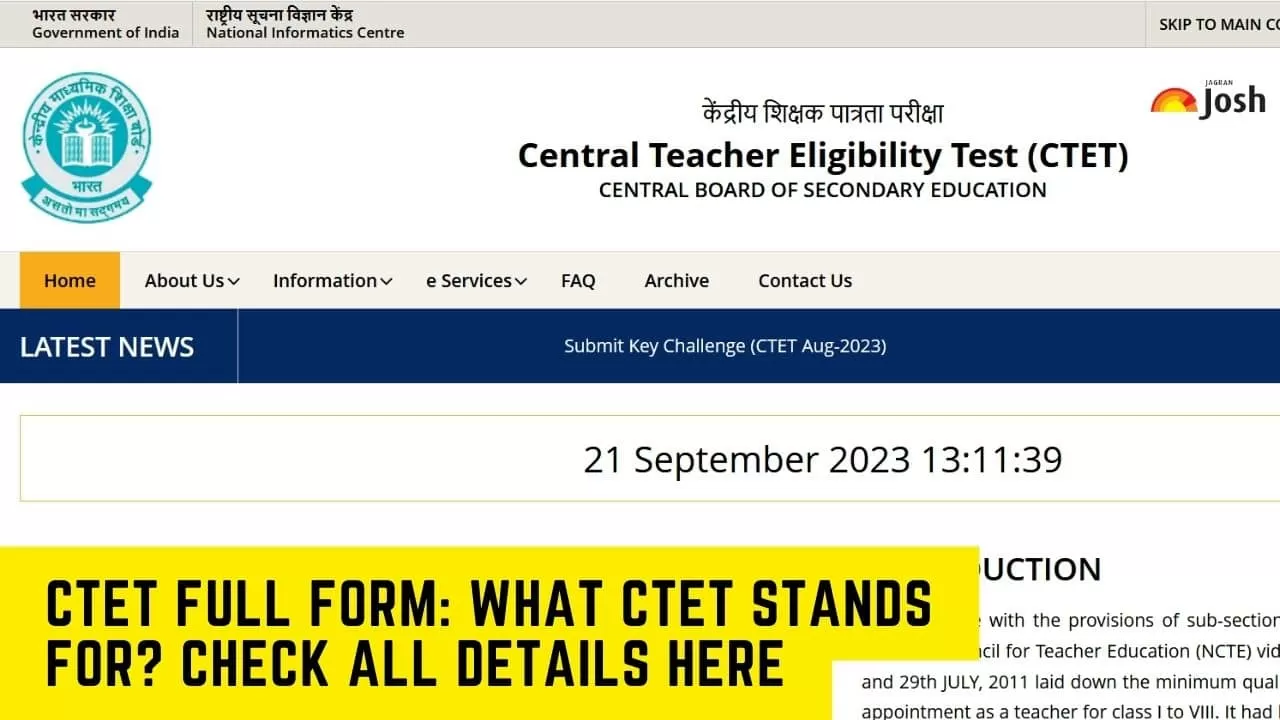CTET full form:CTET, or the Central Teacher Eligibility Test, is an all-India exam administered by the Central Board of Secondary Education that determines the eligibility of candidates wishing to pursue a profession as a teacher in grades 1-8.
The CTET system was first introduced in 2011. The CTET exam consists of two papers: Paper 1 for candidates interested in teaching grades 1-5 and Paper 2 for applicants interested in teaching grades 6-8. It should be noted that individuals interested in teaching classes 6-8 must pass both papers. Both papers (1 and 2) are worth 150 marks.
The examination fee varies depending on the category of the candidate. The application fee for the general or OBC (Other Backward Classes) category is INR 1000, whereas the exam fee for SC (Scheduled Castes) / ST (Scheduled Tribes) / PwD (Person with Disabilities) is INR 500. The CTET exam duration is 2.5 hours. The total number of questions in each paper (1 and 2) is 150, and they are all MCQs. CTET is available in two languages: English and Hindi.
What is the full name of CTET?
The full form of CTET is the Central Teacher Eligibility Test. The Central Board of Secondary Education (CBSE) conducts the CTET exam in accordance with the National Council for Teacher Education (NCTE) Guidelines. The exam is held to determine applicants' eligibility for appointment as Class 1 to 8 teachers in Central Government Schools such as KVS, NVS, and others. Given below is the overview of the CTET examination:
| Particulars | Details |
| Exam Name | CTET(Central Teacher Eligibility Test) |
| Conducting Body | Central Board of Secondary Education (CBSE) |
| Exam Level | National |
| Exam Frequency | Twice a year |
| Application mode | Online |
| Application Fees |
|
| Exam Duration | 150 minutes(2.5 hours) |
| Number of Papers and Total Marks |
|
| Total number of Questions | 150 MCQs in each paper |
| Language | English and Hindi |
| Website | ctet.nic.in |
Why is the CTET exam conducted?
The CTET exam is conducted to hire candidates for teaching positions all around the country. The Indian government created the CTET test to improve the school education system and to set new requirements for teacher profiles. The National Curriculum Framework is the focus of the exam.
What is the eligibility criteria for CTET?
The eligibility criteria for CTET is mentioned below:
| Nationality | Indian |
| Age limit | Minimum age of 17 and no upper age limit |
| Educational qualification Paper I | Class 12th with at least 45% marks and passed or appearing in the final year of 2- year Diploma in Elementary Education (by whatever name known) OR Class 12th with at least 50% marks and passed or appearing in the final year of 4- year Bachelor of Elementary Education (B.EI.Ed). OR Graduation with at least 50% marks and Bachelor of Education (B.Ed) |
| Educational qualification paper II | Graduation and passing /appearing in the final year of 2-year Diploma in Elementary Education (by whatever name known). OR Graduation with at least 45% marks and passing/ appearing in 1-year Bachelor in Education (B.Ed). OR Class 12th with at least 50% marks and passed or appearing in the final year of 4-year Bachelor in Elementary Education (B.EI.Ed) or B.A/B.Sc.Ed or B.A.Ed/B.Sc.Ed. OR Graduation with at least 50% marks and passing or appearing in 1-year B.Ed. (Special Education). OR Any candidate having a qualified B.Ed. The programme recognized by the NCTE is eligible to appear in TET/CTET |
What is the syllabus for CTET?
A summary of the CTET syllabus is given below, for a detailed syllabus for both papers(Paper I and II) visit the official website: ctet.nic.in
| Paper I |
|
| Paper II |
|
Difference between CTET and TET:
Candidates frequently inquire about the distinction between CTET and TET. To begin, both CTET and TET are teacher eligibility tests. CTET is administered at the national level by the central government, whereas TET is administered at the state level by the different state governments. Given below is the difference between CTET and TET:
| Particulars | CTET | TET |
| Conduction body | CBSE | State government educational body |
| Examination frequency | Twice a year | As per state law |
| Age limit | No upper age limit | As per state law |
| Language | English and Hindi | English and state language |
